The big businesses pouring billions into China
Famous free-world firms investing big in the People's Republic
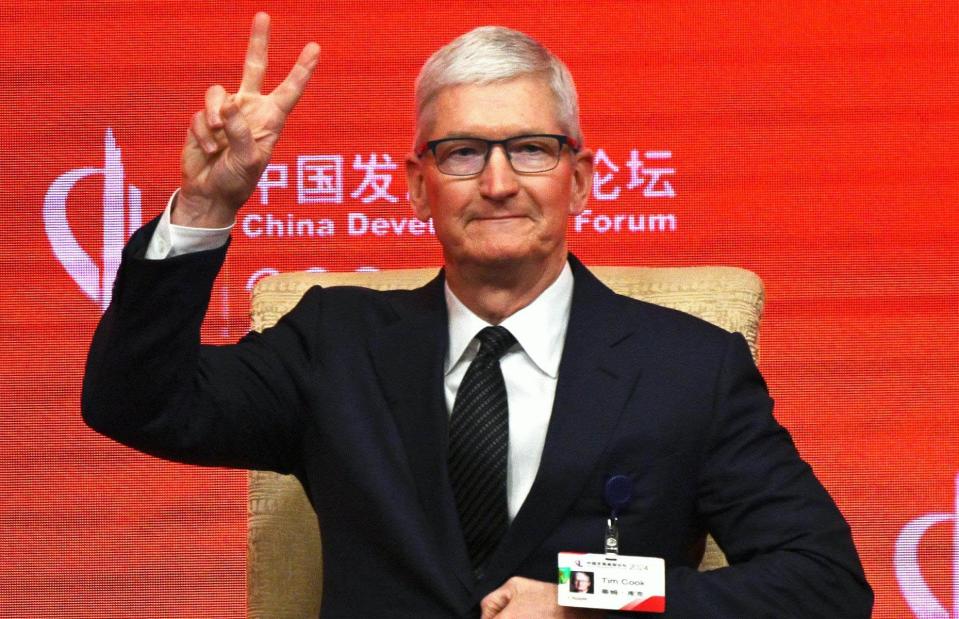
Photo by PEDRO PARDO/AFP via Getty Images
From relentless COVID lockdowns to allegations of high-profile human rights scandals, Western companies have had good reasons to abandon China in recent times. American companies, in particular, are under pressure not to put business China's way, with the Biden administration imposing export controls on various technologies. But plenty of big names are bucking the trend.
Read on to discover the major Western brands buying into the People's Republic right now.
All dollar amounts in US dollars.
Fenty Beauty
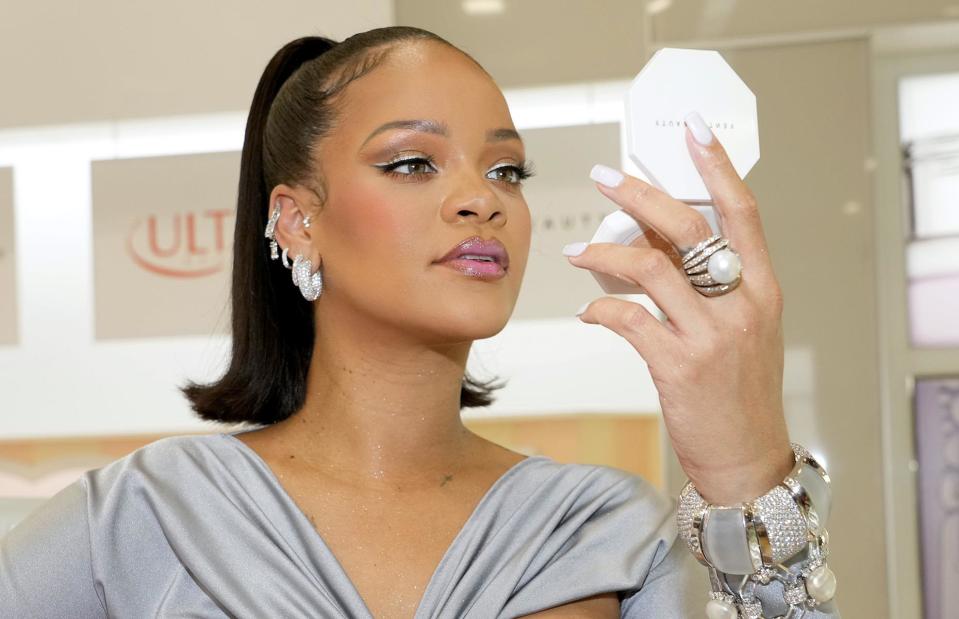
Kevin Mazur/Getty Images for Fenty Beauty by Rihanna
Global superstar and billionaire business mogul Rihanna has been courting China for some time. Items from her cosmetics empire, Fenty Beauty, have been available in the country since 2019, and in March 2024, the brand upped its presence via a deal that will see its products stocked in Sephora stores on the mainland.
In May of this year, the singer appeared at a Fenty Beauty pop-up in Shanghai, serving up jianbing, a popular Chinese street food, to delighted fans.
Adidas
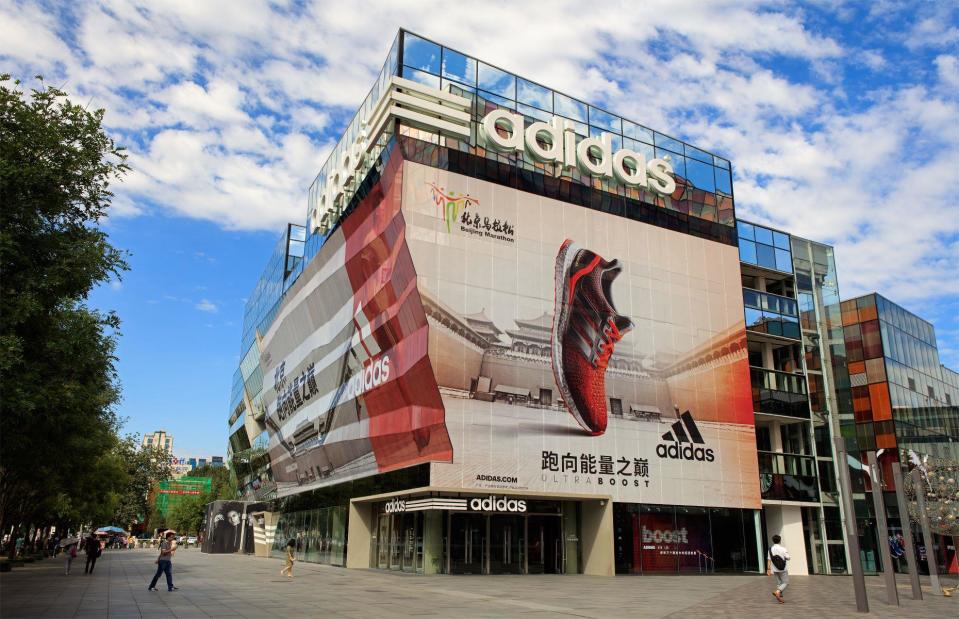
testing/Shutterstock
Almost a quarter of German companies operating in China were planning to relocate production from the country in 2019, according to a report by the German Chamber of Commerce in China. Adidas was no exception. The sports company has halved its Chinese manufacturing since 2010, with much of the production moving to Vietnam, and pledged in July 2020 to cut all ties with suppliers implicated in a report that uncovered forced labour being used in some factories. But, like Apple, it appears to have made a U-turn.
Reuters revealed Adidas had "launched an action plan to try to revive its fortunes in China", which included setting up a Chinese marketing studio and a new product line for Chinese customers. While the sportswear company's overall sales fell 4.8% in 2023, sales in China were up 8.2%. And this March, the company confirmed it expects its Chinese sales to grow at a double-digit rate for the remainder of the year.
Kia Motors
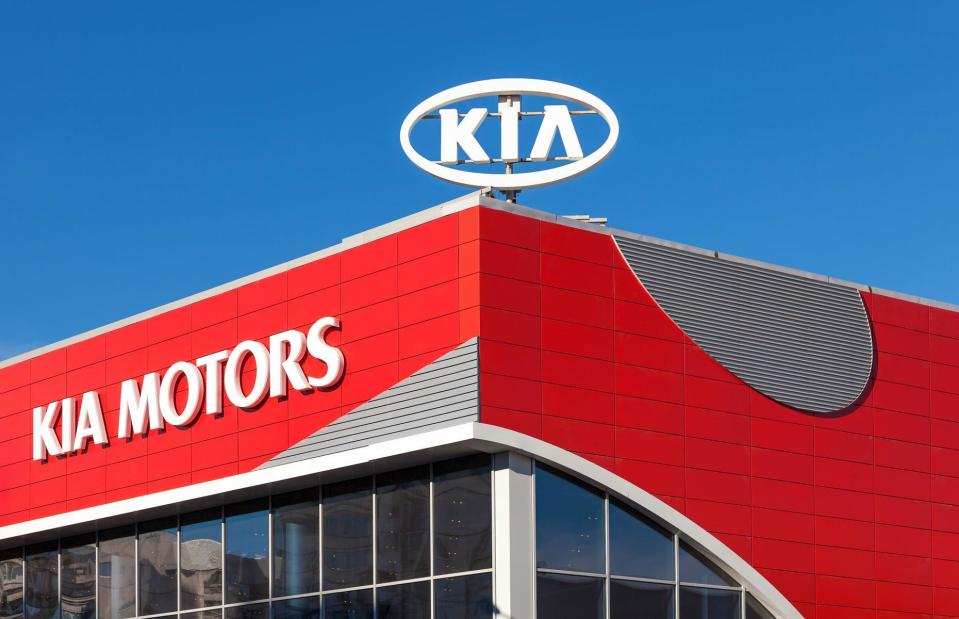
FotograFFF/Shutterstock
Initially drawing back from China, South Korean automaker Kia Motors closed one of its key plants in the country in 2019, blaming a slump in sales sparked by China's 2017 boycott of its country's companies. The snub came after South Korea's military deployed a US-made missile defence system.
However, Kia now seems keen to boost its Chinese presence. At the 20th Shanghai International Automobile Industry Exhibition last April, the company showcased its range of electric vehicles (EVs), with Kia China president Kyung-Hyeon Kim confirming: "The Chinese automotive market holds significant importance for us as part of our global strategy."
To this end, Kia has revealed plans to launch a new EV in China each year up to 2027.
Tesla
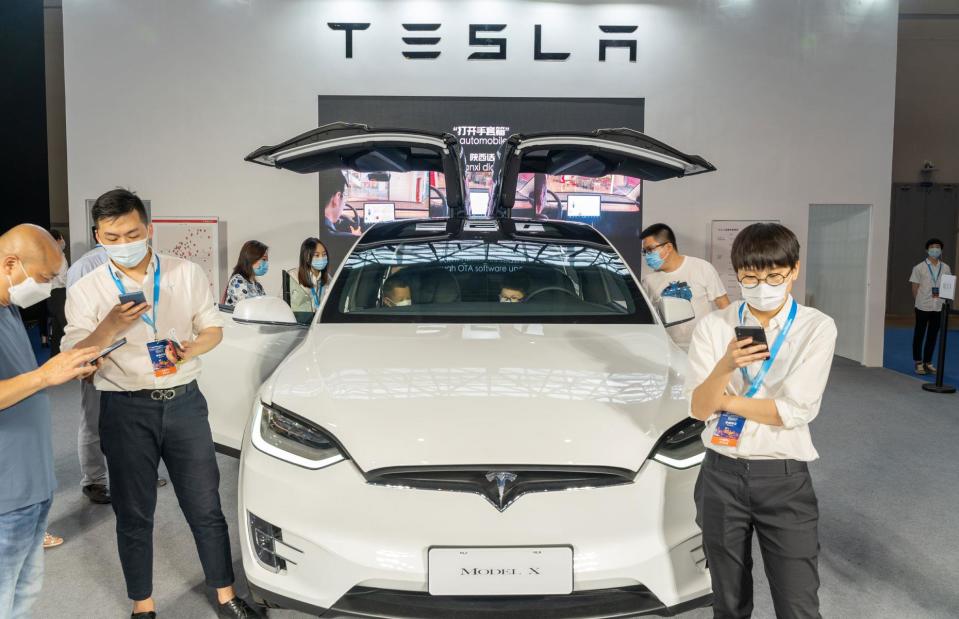
helloabc/Shutterstock
Kia isn't the only carmaker ramping up its Chinese investment. Tesla CEO Elon Musk has been described as having a love affair with the People's Republic, praising its "economic prosperity" on the Communist Party's centenary. Since investing $2 billion (£1.6bn) to build a Tesla gigafactory in Shanghai, completed in 2019, Musk has launched the company's insurance broker in China and joined a lawsuit with 3,500 other US businesses suing the American government for imposing tariffs on Chinese goods. And he hasn't stopped there.
At the end of 2021, Tesla opened a showroom in Xinjiang, a controversial region at the centre of allegations of slave labour and genocide. Musk's actions have sparked fierce criticism, but his Chinese investment seems to be paying off. In August 2022, Musk announced on Twitter (now X) that the company had manufactured its one-millionth car in the country.
Despite strong initial sales, Tesla's revenues in China have taken a downturn recently. A report from the China Passenger Car Association revealed that Tesla’s February 2024 sales were down 19% from the previous year, while recent figures show Tesla's China market share shrank to 4% this April. China is experiencing a recession, making it harder to sell high-end cars, but competition from Chinese brands, including Nio, Li Auto, and BYD may also be having an impact.
The Coca-Cola Company
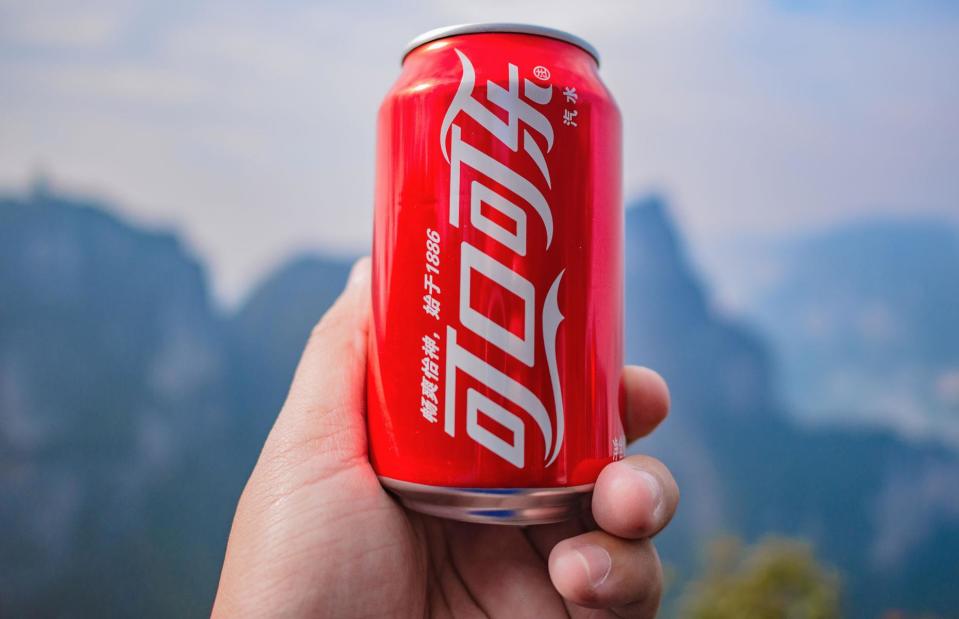
Sumeth anu/Shutterstock
In 1978, Coca-Cola became the first foreign business allowed back into the People's Republic as Chinese-American tensions began to relax. More than 40 years later, the Coca-Cola Company is apparently sticking with China no matter what. "We are here for the long term," said Curt Ferguson, president of Coca-Cola Greater China and Korea, back in March 2020. "We’re here to invest. We’re here to build it."
The Atlanta-headquartered firm, which sells around 140 million servings in China every year, put its money where its mouth is back in August 2020 when it pumped $75 million (£59m) into new production lines and a factory in the country. According to ChinaDaily, in 2022, Coca-Cola launched 20 new products in China.
PepsiCo
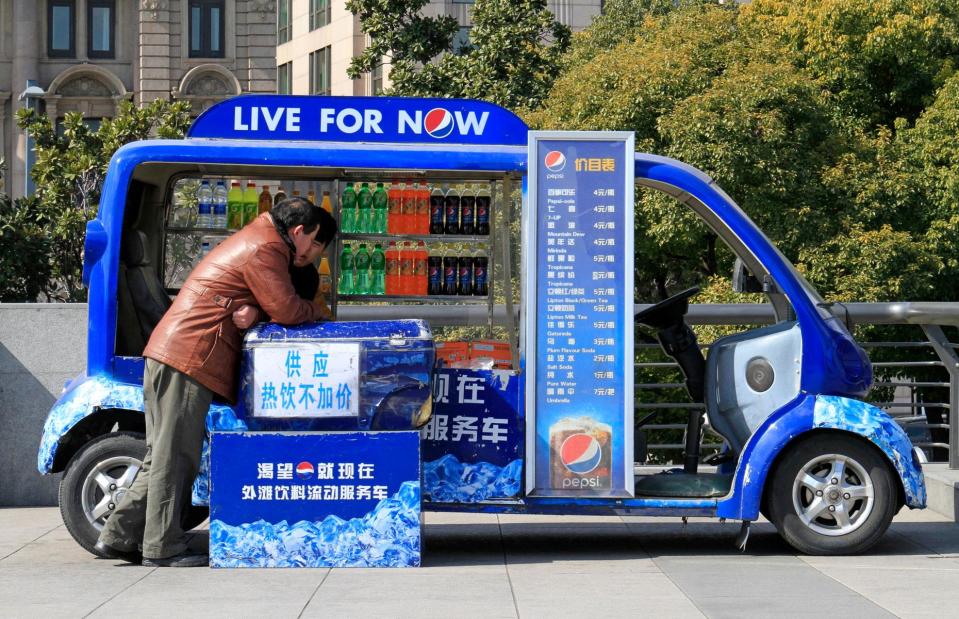
Lensw0rId/Shutterstock
Coca-Cola's arch-rival is going all out to expand in China too. PepsiCo has been operating in the country for 40 years and strengthened its position in March 2020 by spending $705 million (£553m) to acquire Be & Cheery, one of China's leading online snack companies, which sells products such as dried fruit and nuts.
PepsiCo's subsidiary Lay's, the potato chip brand, also proved popular in China in the 1990s. This was partly thanks to the success of newly introduced local flavours such as "cucumber" and "hot and sour fish soup".
McDonald's
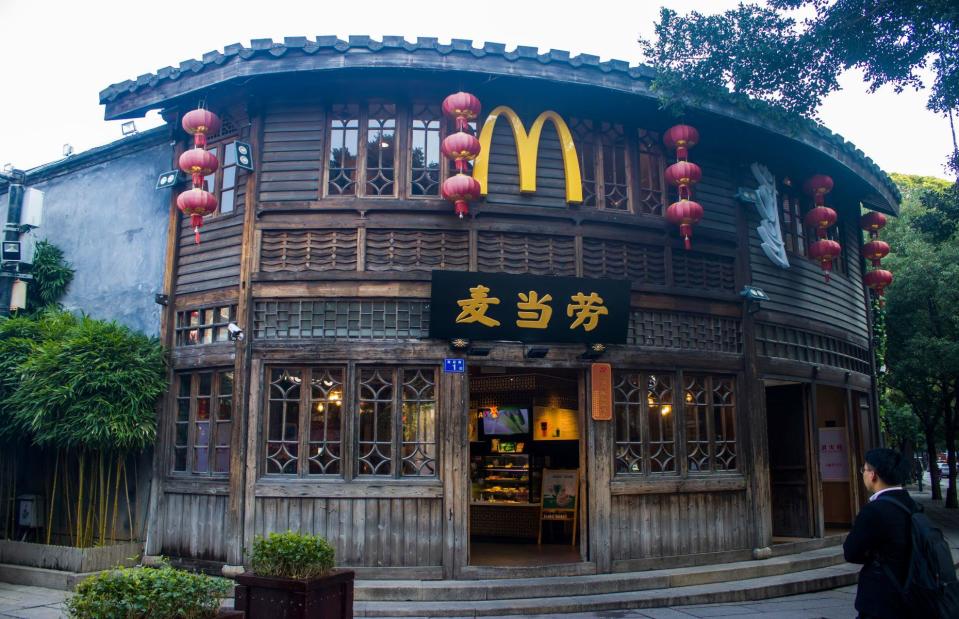
Danny Ye/Shutterstock
McDonald's is the largest fast food chain on the planet but lags behind KFC in China when it comes to market share.
As part of its drive to become carbon neutral by 2050 while increasing its profitability in the People's Republic, the global giant opened its first zero-carbon outlet in Beijing in 2022 and pledged to open hundreds more across the country.
McDonald's currently has around 5,000 locations in mainland China and Hong Kong, employing close to 180,000 people. In December last year, the company unveiled ambitious plans to open nearly 10,000 more restaurants by 2027, with a third earmarked for China. But the retailer has since hit troubled waters; it's currently cooperating with Chinese regulators amid alleged food hygiene concerns in the country.
Microsoft
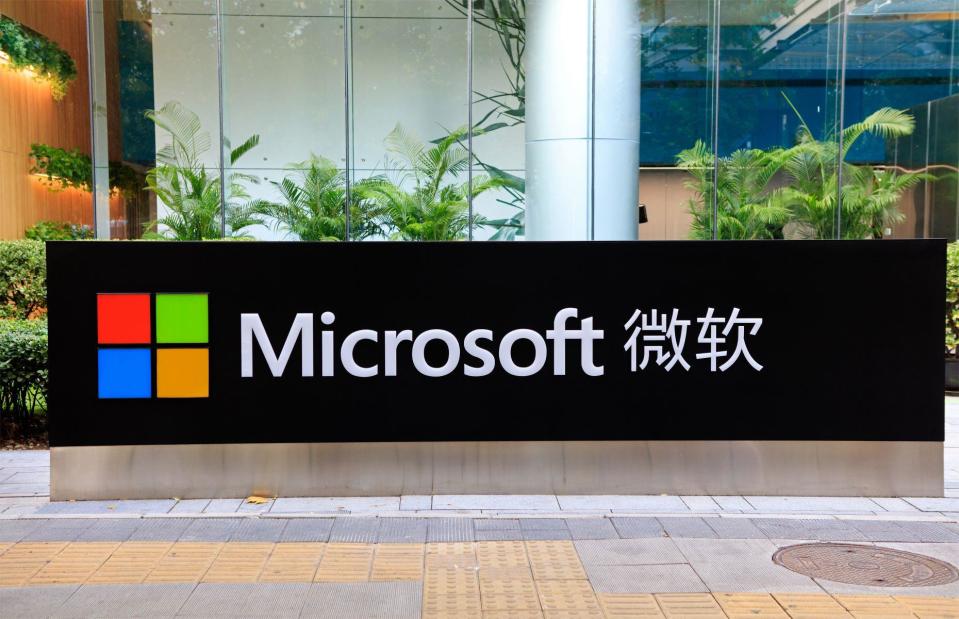
testing/Shutterstock
After moving production of its Surface line of PCs from the US to China in 2017, reports later suggested that Microsoft was planning to move production to Vietnam in 2020. Although Vietnam is home to the company's mobile devices manufacturing business, Microsoft has yet to turn its back on the People's Republic.
Microsoft confirmed in September 2022 that it would expand its Chinese workforce by 1,000 employees, bringing its total number to 10,000. It also plans to upgrade its campuses in Beijing, Shanghai, and Suzhou over the next few years.
Costco
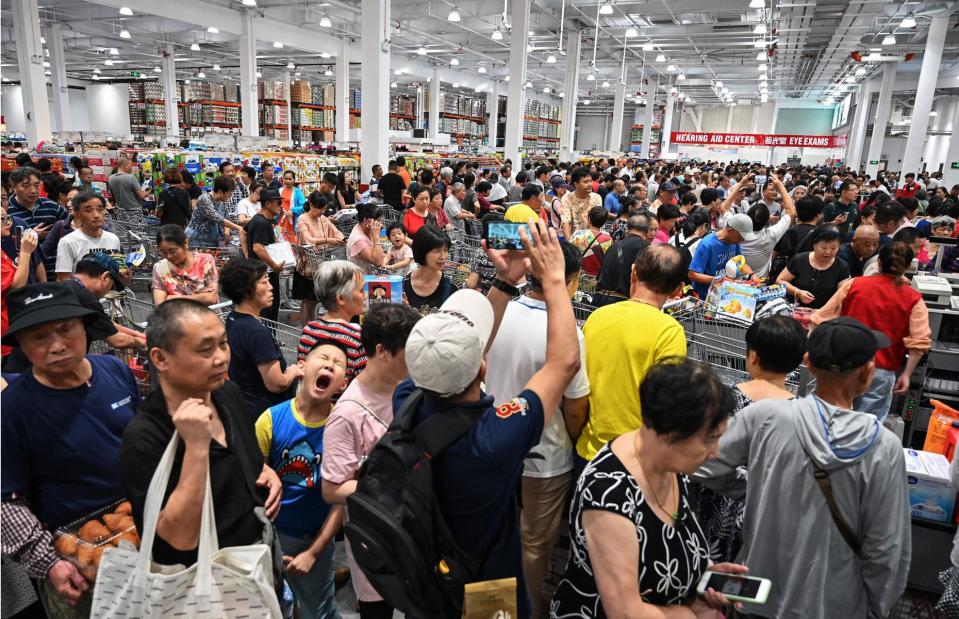
Hector Retamal/AFP/Getty Images
US wholesale chain Costco is also expanding in China. The warehouse club retailer, headquartered in Washington state, opened its first Chinese outlet in 2019, and the Shanghai store – which was so popular that people queued for three hours to get a parking space during the opening weekend – has been successful ever since.
The company now has four outlets in China. The most recent warehouse in Shenzhen, China's "Silicon Valley", opened in January this year and has drawn huge crowds of shoppers.
Liking this? Click on the Follow button above for more great stories from loveMONEY
Walmart
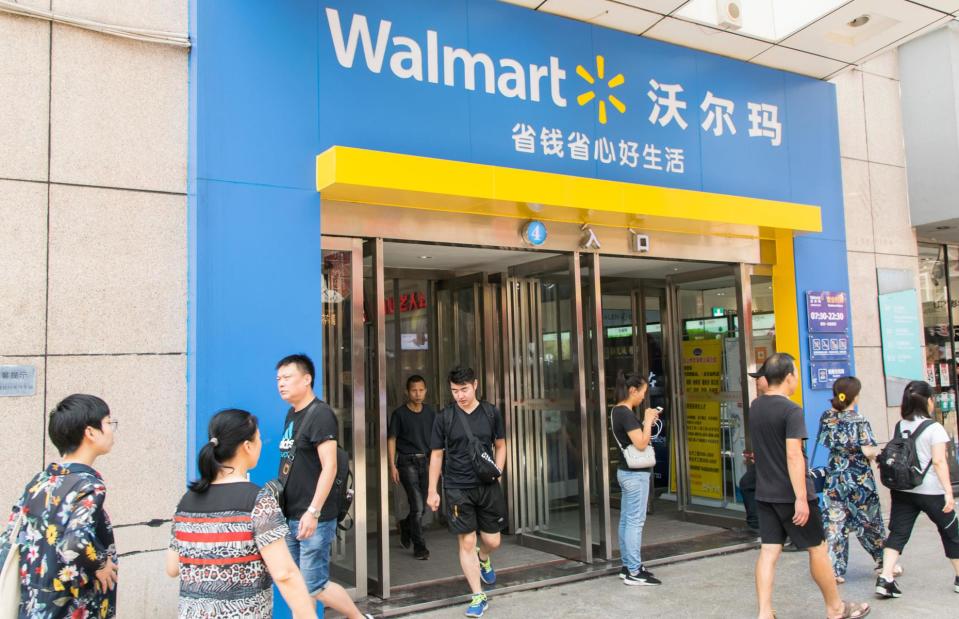
Dan_H/Shutterstock
China's grocery market is now believed to be the largest in the world – and Walmart is keen to cash in. In 2019, the Arkansas-based retail giant, which already had around 400 stores across 170 Chinese cities, unveiled plans to build 500 new stores in China by 2024-26. Walmart is well placed to grow in the nation, thanks to its partnership with Chinese e-commerce company JD.com.
Despite being the second most successful business in China's hypermarket industry in 2011, Walmart slipped to fourth place in 2021, mainly due to competition from Chinese companies such as Alibaba.
Chinese lockdowns also proved an operational challenge for the chain. While all COVID-19 restrictions have been lifted, supermarkets in the country, including Walmart, have struggled amid low consumer confidence stoked by deflationary pressures.
LEGO
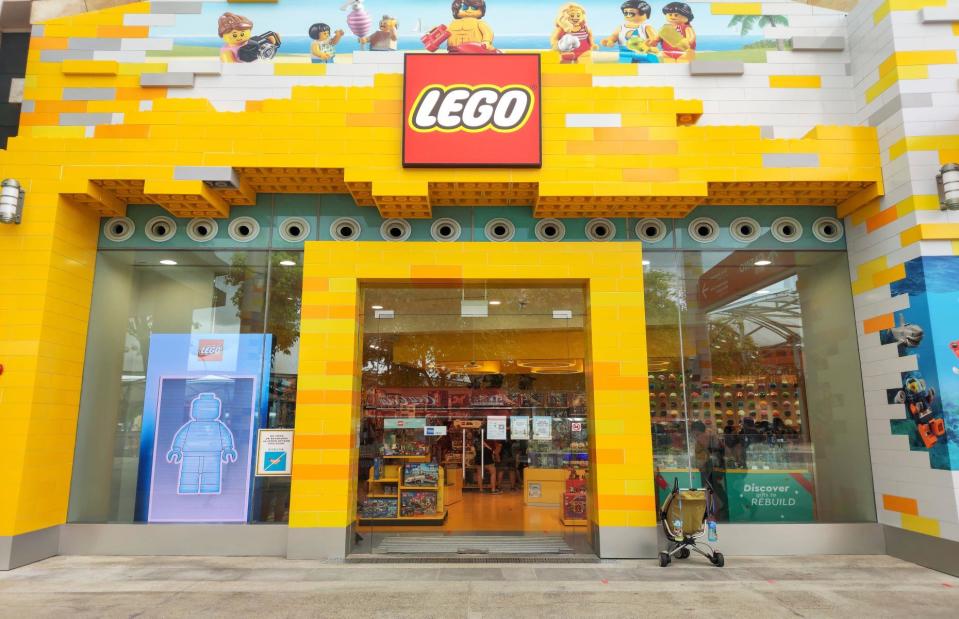
Tang Yan Song/Shutterstock
Danish toy brand LEGO is available in stores in around 130 countries around the world. Although it's long been popular in Europe and the US, LEGO sales in China have historically lagged. In March 2024, the company celebrated "very, very strong progress in the US" while acknowledging sales had slumped in China last year, with CEO Niels Christiansen reporting that Chinese customers were opting for sets at a lower price point. But that doesn't mean LEGO is turning its back on the People's Republic. Far from it.
Back in 2020, the company cited growing Chinese demand as a key driver of rising consumer sales, which jumped by 21% that year. It's since been expanding the number of stores in the country, adding 300 by the end of 2021 and a further 46 in the first six months of 2022. This means roughly two-thirds of its new stores in 2022 were built in the nation – and it's not stopping there. By the end of this year, LEGO plans to have opened an additional 40 stores in China, with Christiansen saying: “We are on the growth journey in China and hoping and expecting to get back to growth."
ALDI
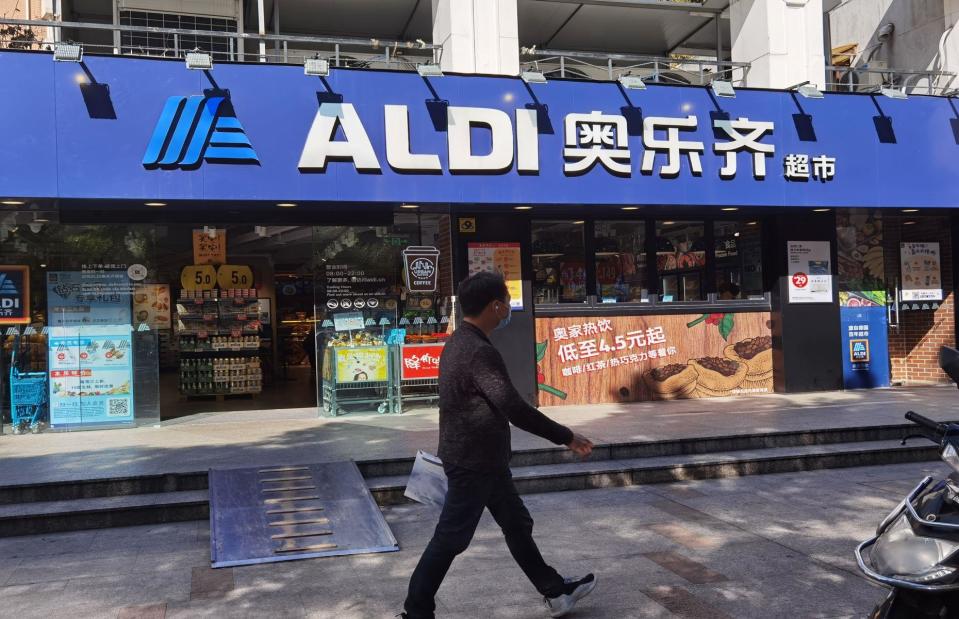
Brookgardener/Shutterstock
German supermarket chain ALDI currently operates more than 12,000 stores across 18 countries. It currently operates 52 stores in China.
ALDI started investing in its Chinese expansion back in 2019 and has been growing rapidly ever since. The chain has ambitious plans to open hundreds more stores across the country, including dozens in Shanghai.
Danone
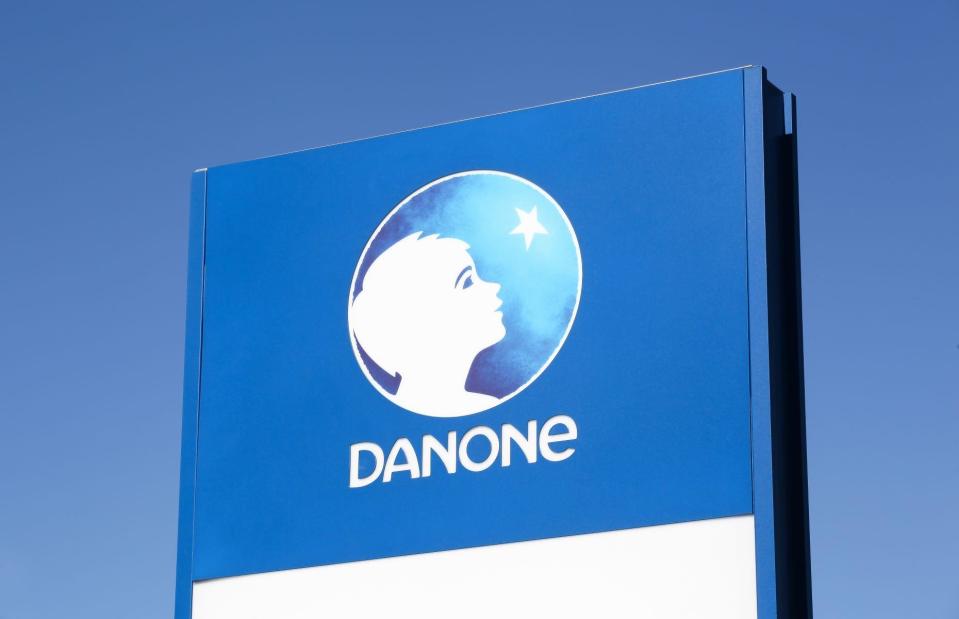
ricochet64/Shutterstock
Yet another European company expanding in China, French food conglomerate Danone has launched a range of nutritional drinks on Alibaba's Tmall platform and Douyin, the Chinese version of TikTok. The probiotics powder drinks are the latest additions to Danone's Chinese product line, which also includes infant formula, rice powder, and goat's milk.
Back in March 2022, Danone "reached a strategic cooperation" with formula company Eurbest Nutritional Food, which is based in Hunan Province, and later stated that "China remains highly strategic for Danone".
Nestlé
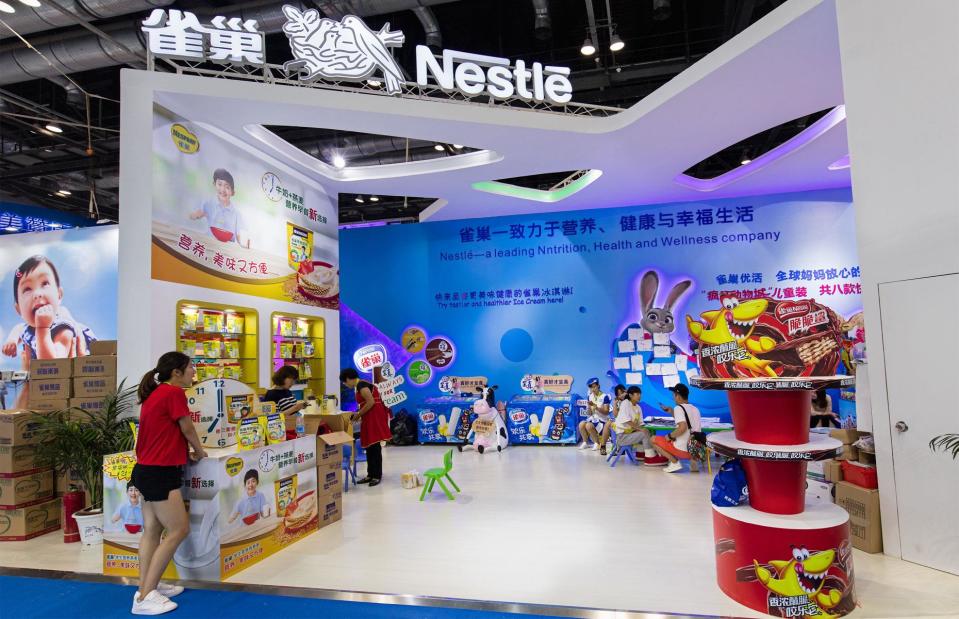
testing/Shutterstock
Swiss company Nestlé, the world's largest food company, is also eager to expand in the People's Republic. In May 2020, the business announced that it was investing over $103 million (£81m) to strengthen its operations in the country. This included opening a plant-based products facility in the city of Tianjin.
Nestlé also launched its plant-based brand Harvest Gourmet in China in December 2020, which sells meatless burgers and sausages, as well as local dishes such as kung pao chicken. In July 2022 the conglomerate launched China's first carbon-neutral toddler formula, a product called Organic NAN 3.
Earlier this year, Nestlé China reported 2023 sales of around $6 billion (£4.7bn), up 4.2 per cent on the previous year.
Apple
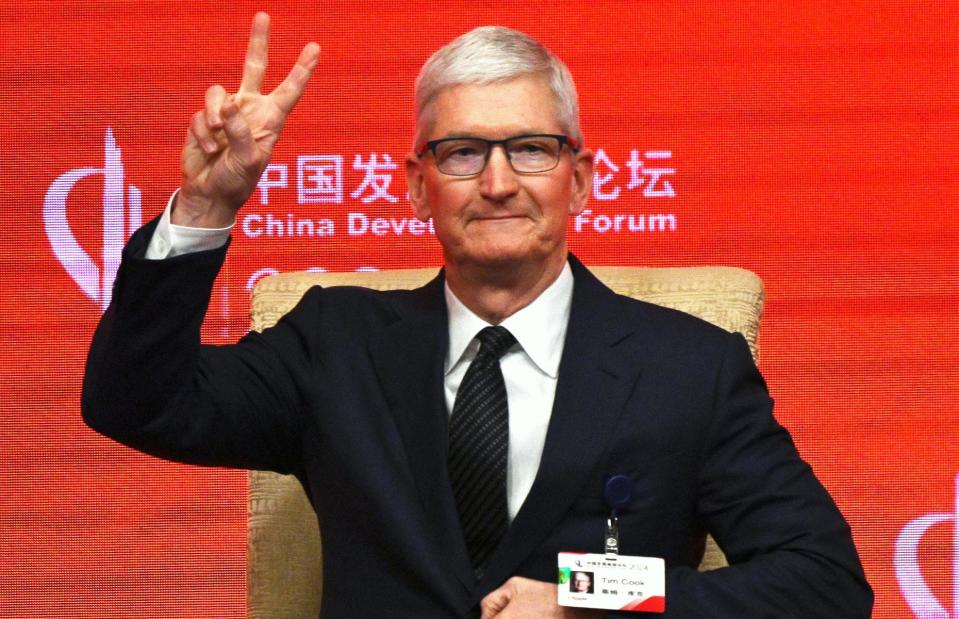
Photo by PEDRO PARDO/AFP via Getty Images
Apple has had a rollercoaster relationship with China over the years. Back in 2022, reports emerged that the American tech giant was planning to shift its supply chain away from China and towards alternative nations such as India and Vietnam – all part of a long-term goal to reduce its reliance on the People's Republic amid ongoing COVID-19 lockdowns. But although the company now manufactures around one in seven of its iPhones in India, it's certainly not abandoning China completely – for better or worse.
In fact, CEO Tim Cook (pictured) has been doubling down on the major market, even attending this year's China Development Forum. Cook praised the "critical" role the nation has played in Apple's business and confirmed the Apple Vision Pro will hit Chinese stores later in 2024. He also met with the Chinese commerce minister Wang Wentao to discuss the stabilisation of supply chains.
But amid reports that Apple is ramping up its investment in India and its sales in China fell by 8% in the fiscal quarter ending 30 March, it's unclear whether a full manufacturing U-turn is on the cards...
Mercedes-Benz Group
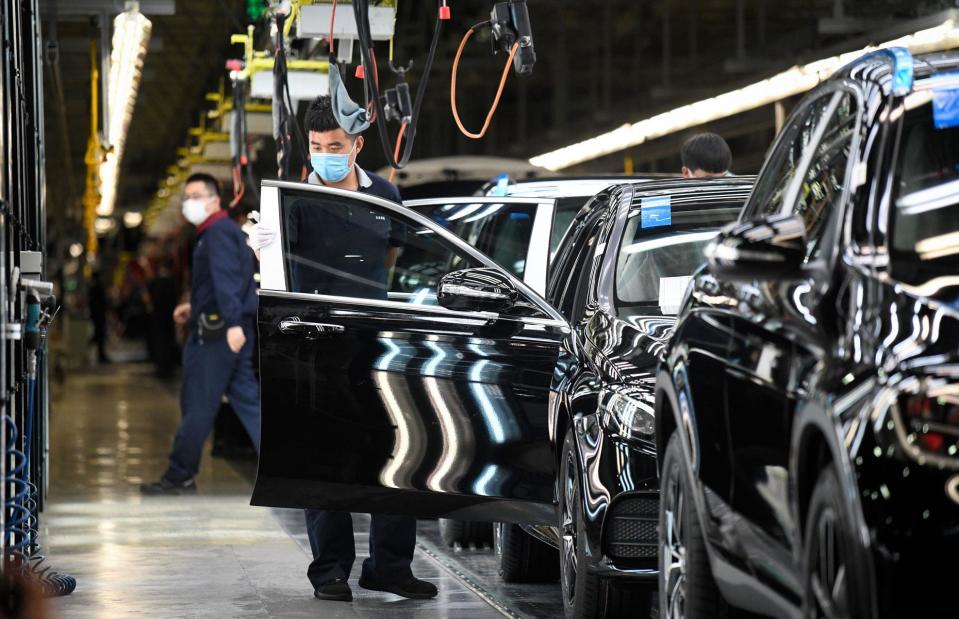
Wang Zhao/AFP/Getty Images
Germany's Mercedes-Benz Group (formerly Daimler) has been doing a roaring trade in China. It's no surprise, then, that it's concentrating its global expansion plans in the country and has prioritised investing in Chinese facilities over increasing its production in Germany, according to the Financial Times.
The company set a Chinese car sales record in 2020, selling more than 774,000 cars – or around one in three of the company’s total deliveries – to the People's Republic, and roughly maintained these sales figures in 2022 before seeing a minor dip in 2023. In fact, Mercedes-Benz’s move into China is going so well that the company boosted its capacity for building Mercedes-Benz cars at two of its Beijing plants by 45%.
Lavazza
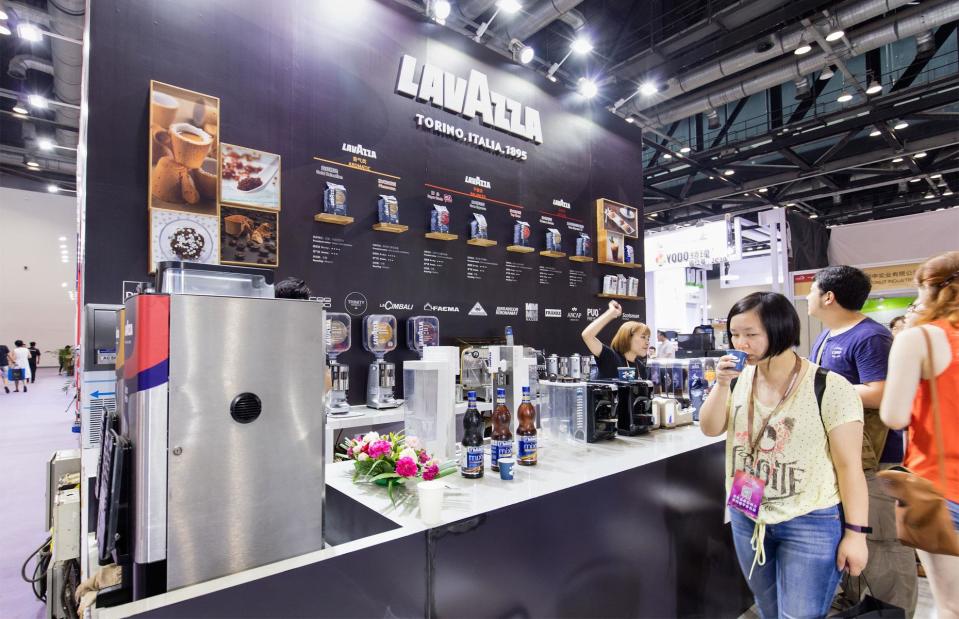
testing/Shutterstock
Italian family-owned coffee company Lavazza made its first foray into China in 2020 when it opened a flagship coffee shop in Shanghai. Famed for its smooth espresso, the firm has partnered with Yum China to develop its coffee shop concept in the People's Republic. In September 2021, the partnership announced its intention to open 1,000 Lavazza coffee shops throughout China by 2025.
While these expansion plans have stalled somewhat, Lavazza currently operates over 100 stores in 11 Chinese cities.
Tim Hortons
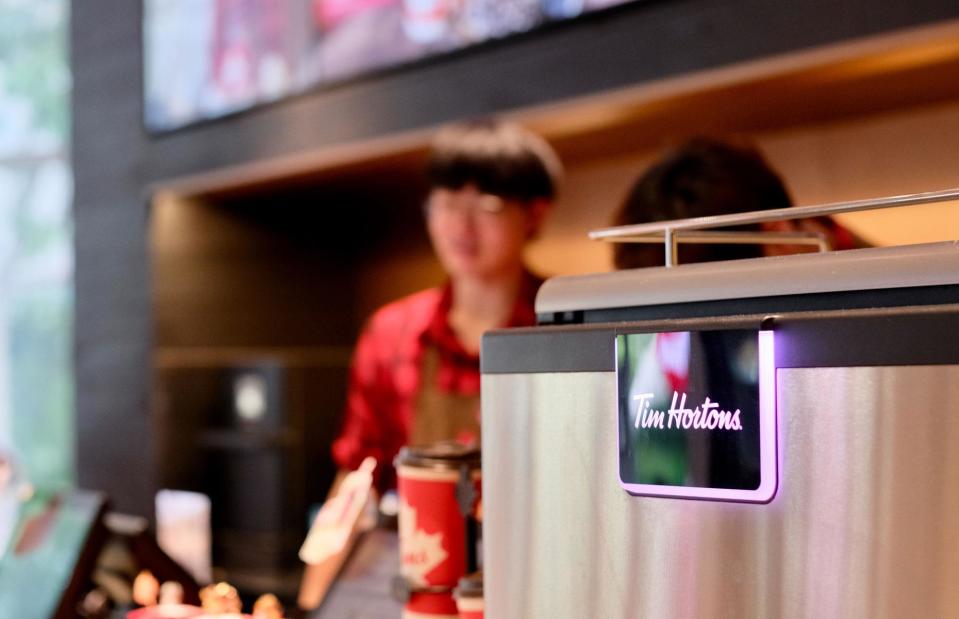
Robert Way/Shutterstock
Canadian coffee shop chain Tim Hortons has even bigger aspirations. In October 2022, just three years after Tim Hortons first took on China, it opened its 500th store in the People's Republic, with the Toronto-headquartered company planning to expand its presence in the country to 2,750 locations in the coming years.
As of 2024, the company operates more than 900 Tims China outlets in the country.
Starbucks
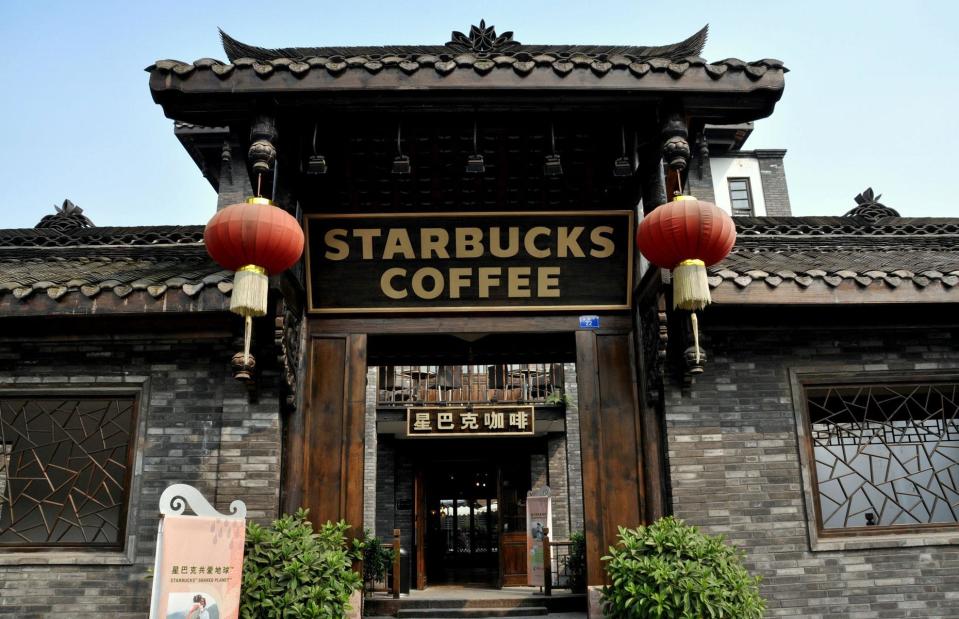
Lee Snider Photo Images/Shutterstock
Staying with Western coffee shop chains, Starbucks is firmly established in China, which is currently its second-largest market. The US company made its Chinese debut in 1999 and today boasts over 6,500 stores in over 250 cities, employing more than 60,000 people.
The company has a goal of opening 9,000 stores in China by 2025 and recently launched a pork-flavoured coffee to celebrate Chinese New Year. But it's not all go, go, go; according to a report published by CNN, Chinese coffee chains have been battling to undercut each other's prices, forcing Starbucks to offer coupons that reduce the price of its lattes from the equivalent of around $4.20 (£3.30) to $2.80 (£2.20). This, coupled with tightening consumer spending, could explain why the average amount spent by Starbucks customers in China declined by 9% in the first quarter of the year.
JPMorgan Chase
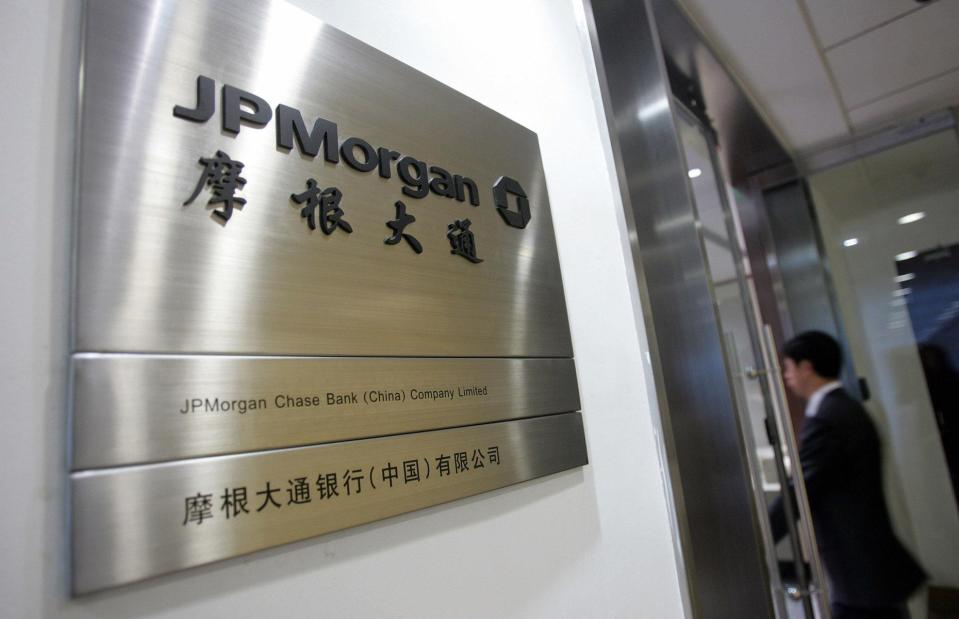
STR/AFP/Getty
New York investment bank JPMorgan Chase is also gaining ground in China. In August 2020, the financial services company bought out Chinese partner Shanghai International Trust for $1 billion (£785m), securing full control of its mutual fund joint venture. In March 2021, JPMorgan Chase bought a 10% stake in China Merchant Bank’s wealth management arm for 2.7 billion yuan ($417m/£327m), and at the beginning of July 2021 the firm applied to purchase 100% of its securities joint venture in the country, up from the 71% it previously owned.
The bank hasn't been entirely uncritical of China, however. In 2022, JPMorgan Chase CEO Jamie Dimon said the country could face "serious issues" due to its reliance on food and energy imports and called on the US government to take a stand against Beijing and apply "geopolitical pressure" to the People's Republic.
BrewDog
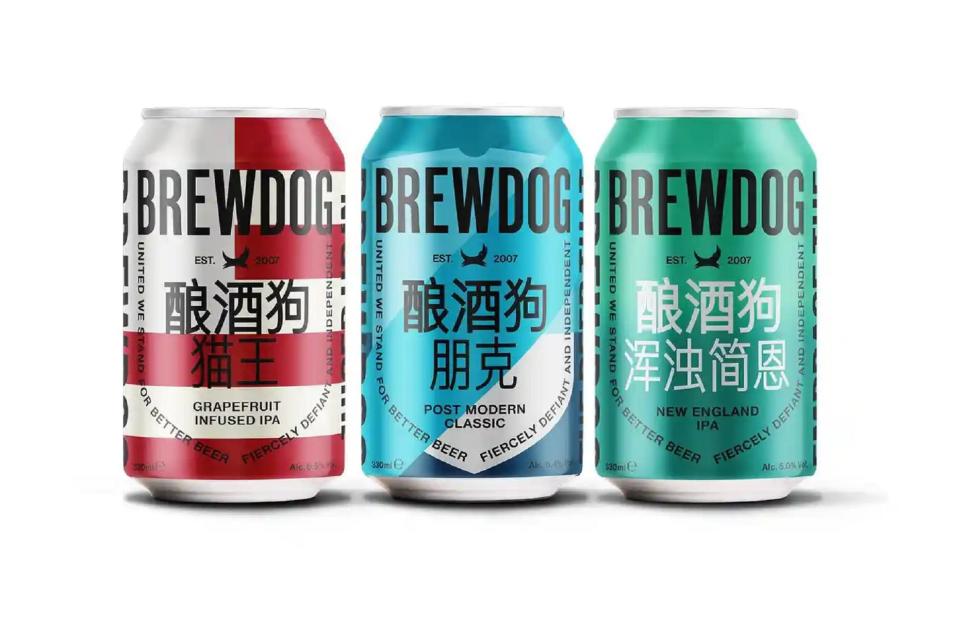
Courtesy BrewDog
Headquartered in Scotland, brewery BrewDog has claimed to be the "#1 Craft Brewer in Europe". Now it's setting its sights further afield, partnering with Budweiser China to break into the Chinese market.
As part of the deal, Budweiser China is producing three BrewDog beers – Punk IPA, Hazy Jane, and Elvis Juice – at its Putian brewery. BrewDog also plans to open nine new bars throughout China in addition to its existing location in Shanghai.
ExxonMobil
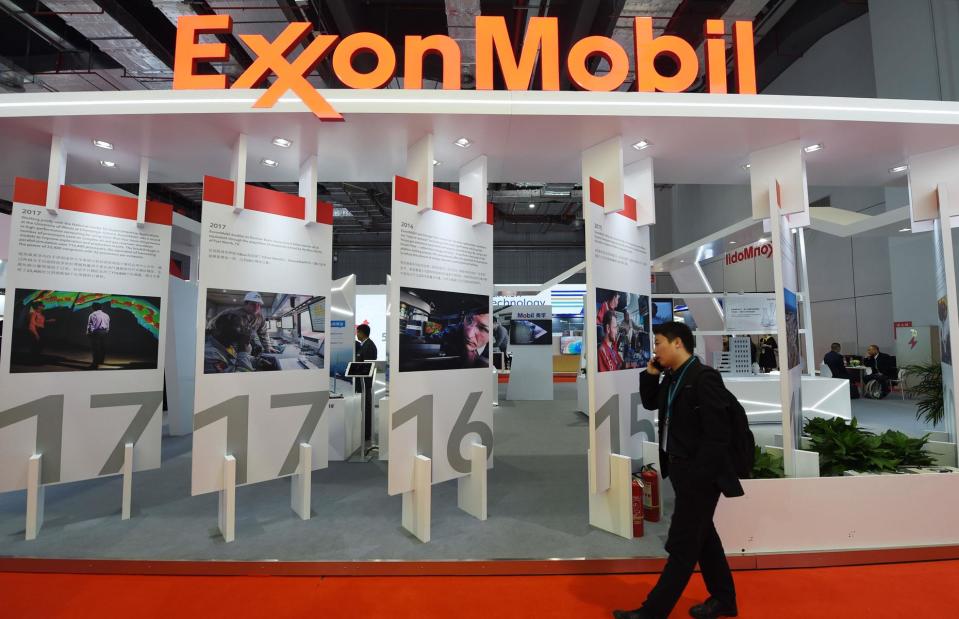
Fan Peishen/Xinhua News Agency/PA
Despite the pandemic, there have been a number of high-profile foreign mergers as regulations on overseas ownership have eased. In 2020, a change in legislation allowed foreigners to own Chinese chemical plants. This prompted Texan oil and gas corporation ExxonMobil to build a $10 billion (£7.8bn) petrochemical complex in Huizhou, a city in China's Guangdong province.
But the business relationship goes back much further. ExxonMobil's predecessor, Standard Oil, sold kerosene to light Chinese lamps in the 1890s.
Universal Parks & Resorts
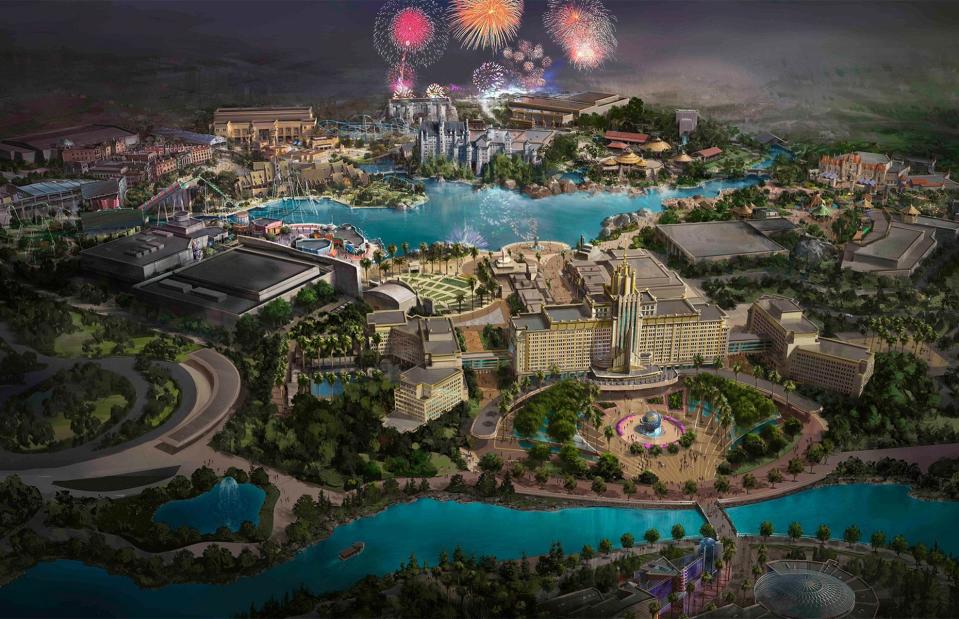
Courtesy Comcast/Universal Studios
Universal Studios' 50 billion yuan ($7.7bn/£6bn) theme park in Beijing was delayed because of the pandemic but finally opened to the public in September 2021. A joint venture between state-owned Beijing Shouhuan Cultural Tourism Investment Co. and Universal Parks & Resorts, the park was 20 years in the making and is now the largest Universal Studios park in the world.
The companies hoped that Harry Potter-themed attractions and the Kung Fu Panda Land of Awesomeness would help to win over Chinese visitors. But it hasn't all been plain sailing. Like tourist attractions all over the country, the park was forced to shut its doors to comply with China's COVID-19 measures, reopening in June 2022. Revenue and visitor figures for 2023, its first full year of operation, are apparently yet to be released.
Volkswagen
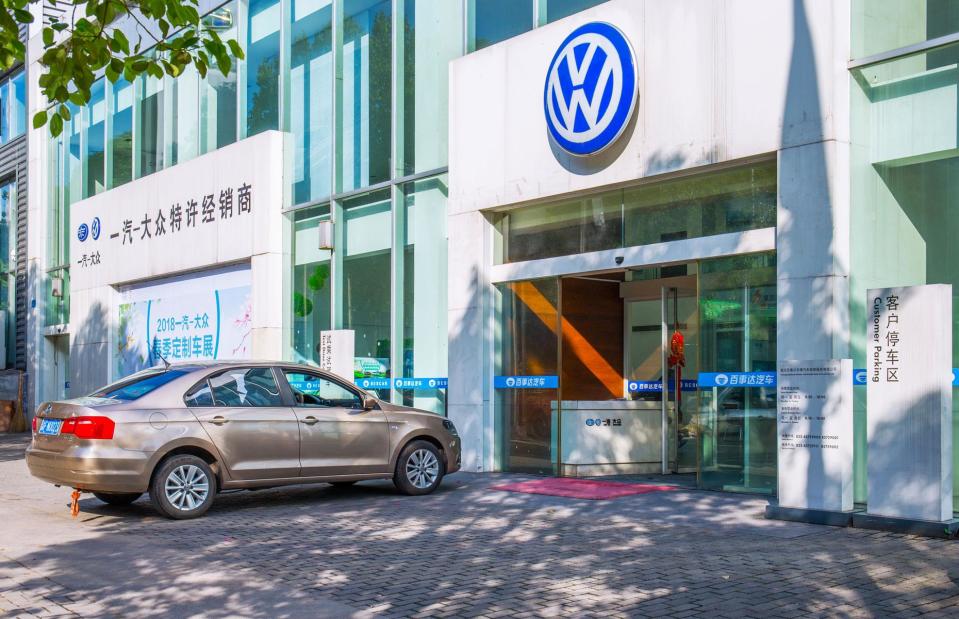
xujun/Shutterstock
Another German carmaker keen to tap into the Chinese market, Volkswagen acquired a sizeable stake in Chinese electric vehicle battery maker Guoxuan High-Tech in 2020. The business spent $1.1 billion (£860m) to take control of its joint venture with Anhui Jianghuai Automotive (also known as JAC Motors) and planned to invest a further $12.8 billion (£10bn) in Chinese electric mobility between 2020 and 2024.
Speaking to China Daily, the CEO of Volkswagen Anhui said the mass production of neighbourhood electric vehicles (NEVs) would start at its Hefei plant – which is reportedly the same size as 16 football fields – by the end of last year.
But the automaker has now hit headlines for all the wrong reasons. According to an article published by CBS News, Volkswagen is one of three Western car companies (the others being BMS and Jaguar Land Rover) that have bought parts produced by JWD, a Chinese company that's been placed under sanctions for using forced labour.
American Express
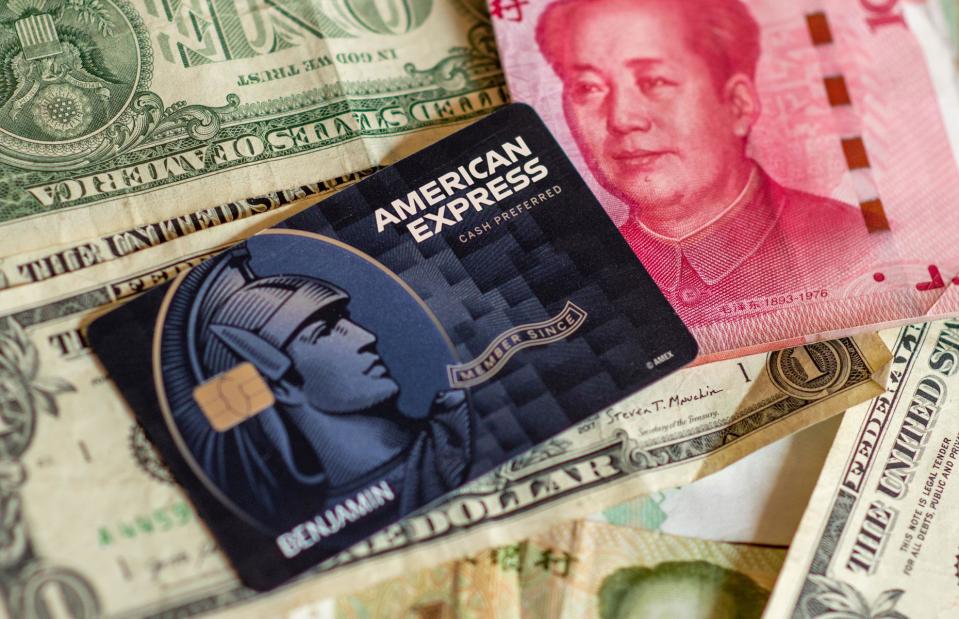
Hiram Rios/Shutterstock
In June 2020, American Express (Amex) became the first foreign credit card company to operate in China. Now permitted to clear payments in yuan, the New York-headquartered corporation partnered with Chinese financial technology firms to tap into the opportunity-packed market, while US competitors Mastercard and Visa both gained initial approval to follow suit back in 2020.
Amex has also issued debit cards to the Chinese market in partnership with China Industrial Bank, according to Forbes.
Shake Shack
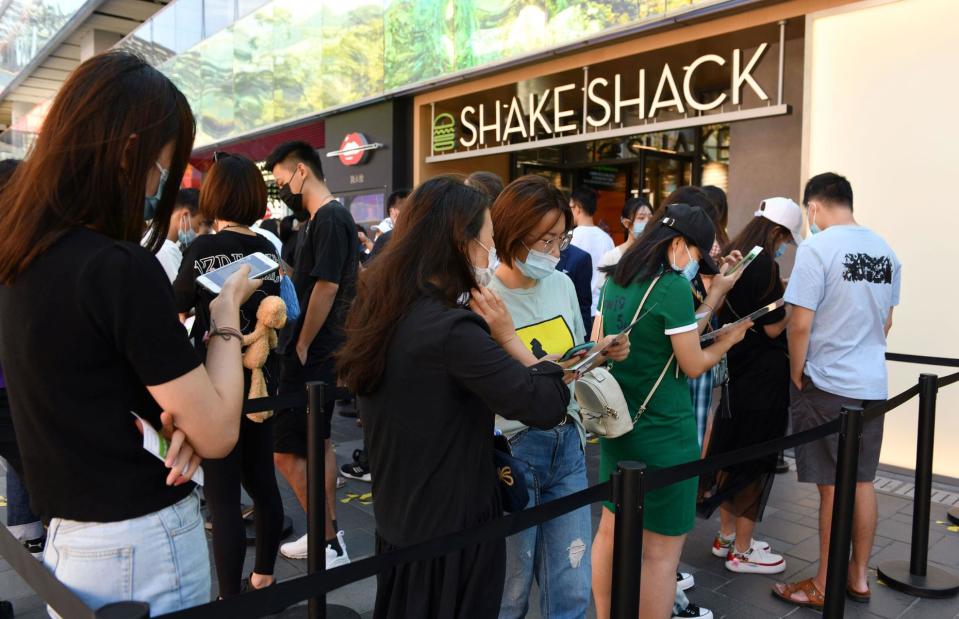
Greg Baker/AFP/Getty
American fast food chain Shake Shack is planning to open 55 franchised locations in mainland China by 2030, with CEO Randy Garutti telling CNBC that the chain has "big plans for Asia".
Following successful launches in Shanghai and Beijing, the chain opened its first South China store in the MixC World Shopping Mall in the Guangdong province back in May 2022 and now aims to open at least 15 South Chinese stores by the end of the decade.
Airbus
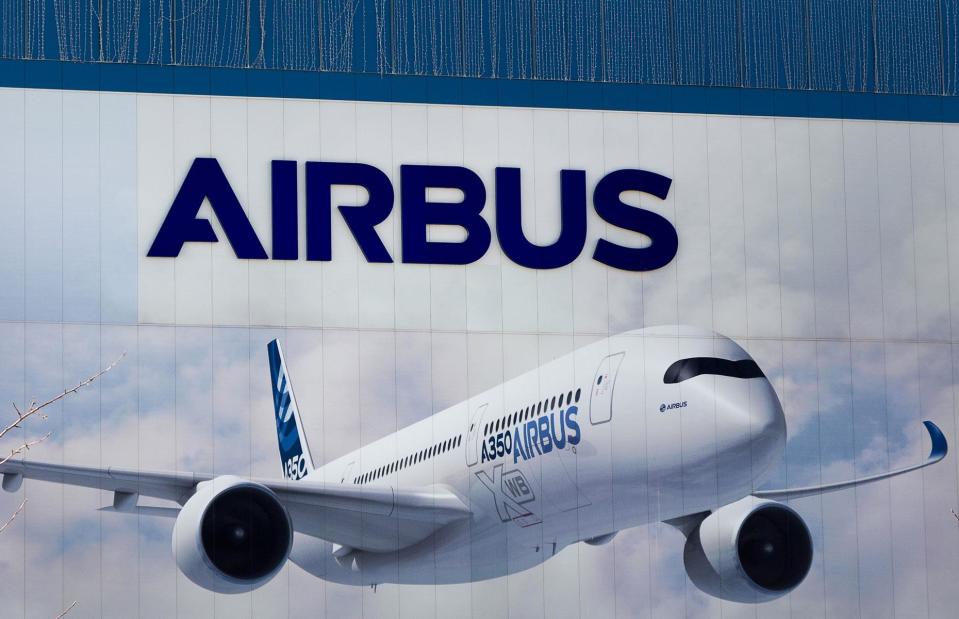
Manuel Esteban/Shutterstock
With China poised to become the world's largest aviation market, Western aircraft manufacturers are eager to expand in the country. European multinational Airbus, for example, has pledged to boost assembly of its commercial jets and increase its cargo business in the Asian nation.
In 2022, Airbus announced that it had accepted an order for almost 300 jets from Chinese state airlines. This is likely to provide a much-needed boost after the turbulence of the COVID-19 pandemic, which saw the company lose more than $1 billion (£785m) in 2020. The company later announced that China Aviation Supplies (CASC) has signed a purchasing agreement for another 140 Airbus jets, bringing the total deal to a whopping $17 billion (£13.4bn).
Nu Skin Enterprises
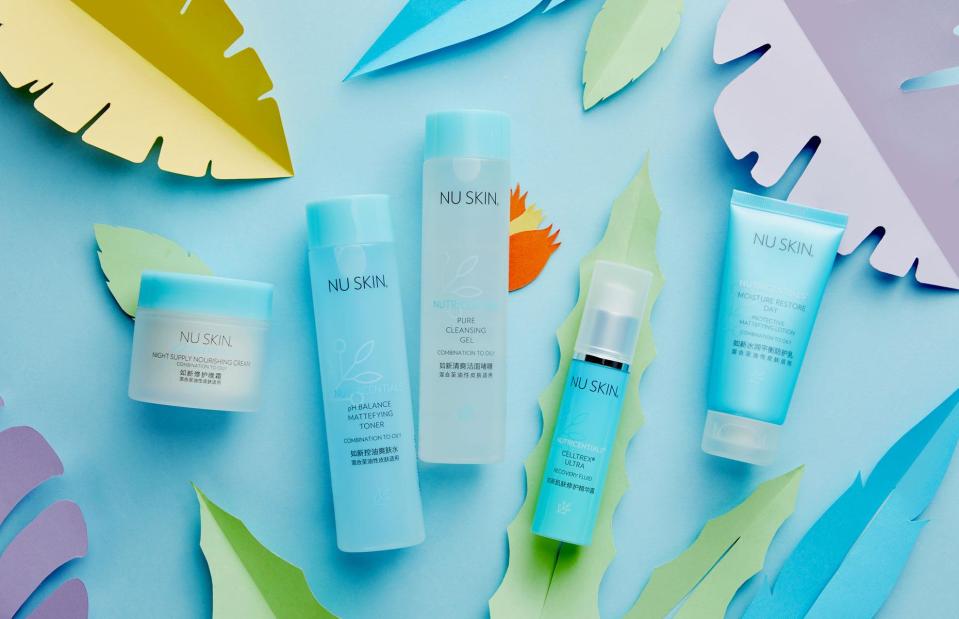
supermodel/Shutterstock
Utah-based personal care and dietary supplement company Nu Skin Enterprises plans to increase its presence in the People's Republic after scoring an investment of $210 million (£165m) from a Chinese consortium in 2016.
In August 2020, the company announced plans for a new manufacturing site in the Fangxian district of Shanghai. The facility, which reportedly cost $55 million (£43m) to build, opened in November 2023 and is set to quadruple production capacity for the beauty and wellness firm in China.
Magna International
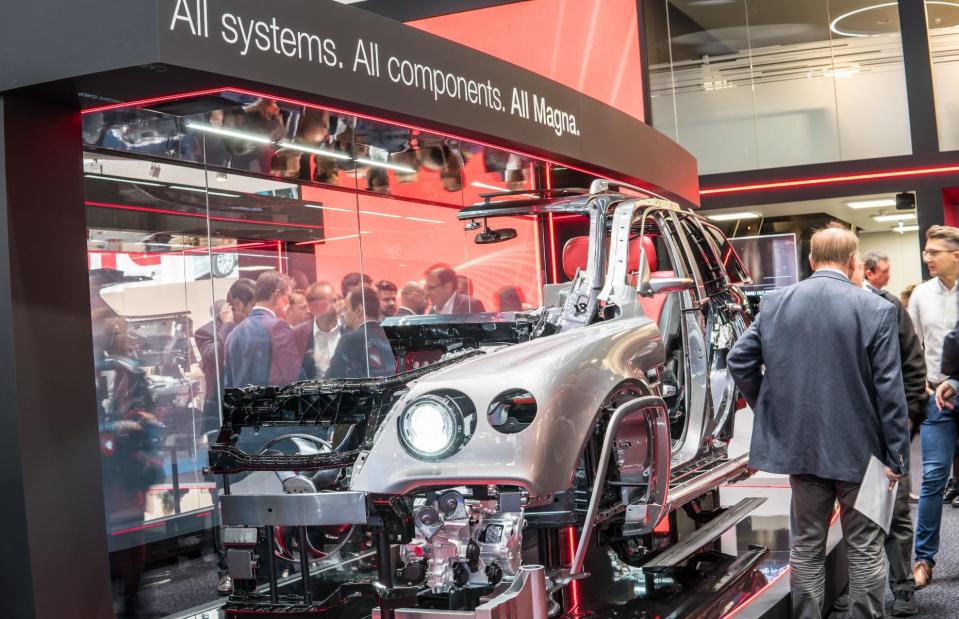
Grzegorz Czapski/Shutterstock
Canadian mobility technology company Magna has 93 centres across 27 countries, and in September 2020 the firm announced it was deepening its Chinese ties. Magna partnered with Honglizhixin, a company that produces seats for Chinese automakers, in 2015 and now the Ontario-based company has acquired a majority stake in the supplier. The move is part of Magna’s plan to deliver "high-quality seat technology" to domestic and foreign markets, highlighting its "strong commitment to the China market".
Today it reportedly employs 35,000 people across 85 facilities in China.
Bayer
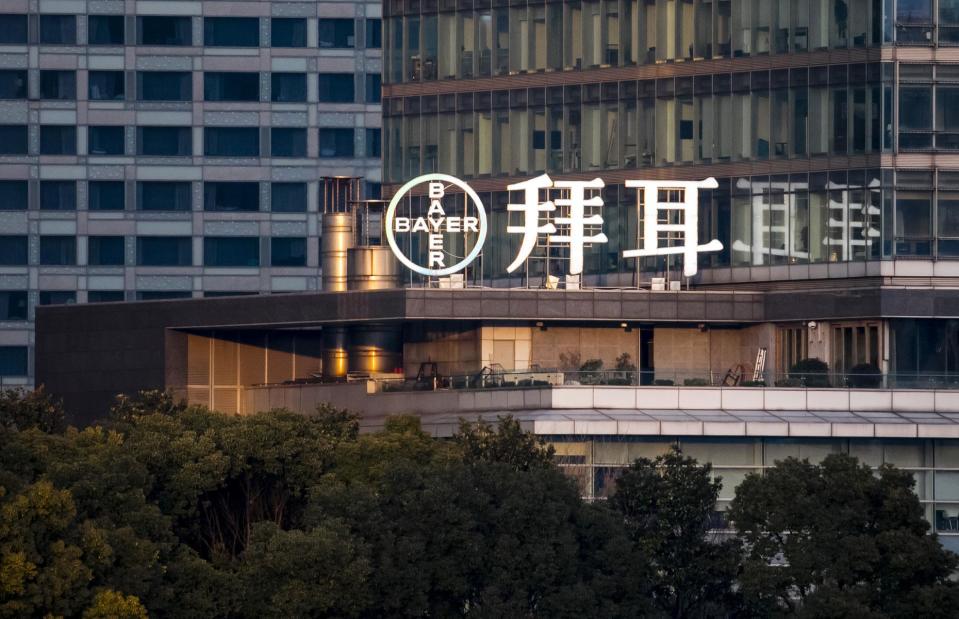
Vincent Isore/IP3/Getty Images
As the Chinese government's "Healthy China 2030" initiative aims to simplify the medication approval process, Western pharmaceutical companies such as Bayer are eager to invest in the country.
The German drugmaker, which already has a strong footing in China, is constructing a new $59 million (£46m) plant in Beijing to shore up supplies of heart and diabetes medications. It's also launched Bellerain, a new skincare brand designed specifically for the Chinese market.
BASF

Rudolf Stricker, Attribution, via Wikimedia Commons
In October 2022, German chemical company BASF – the biggest foreign chemical investor in China – confirmed its plans to spend $10 billion (£7.9bn) on constructing an integrated chemical production site in Zhanjiang, located in South China's Guangdong Province. The company unveiled the first plant in September 2022, with the whole site currently due for completion in 2030. The plant will eventually produce 60,000 metric tonnes of plastic every year for the Chinese electronics and automotive industries.
CEO Martin Brudermüller has said that Germans should "step away from China-bashing and look at ourselves a bit self-critically" and that BASF executives "came to the conclusion that it is advantageous to expand our involvement" in the People's Republic.
Now discover the goods the West relies on China for, and what it’s doing to wean itself off
Updated by Alice Cattley

 Yahoo Finance
Yahoo Finance 